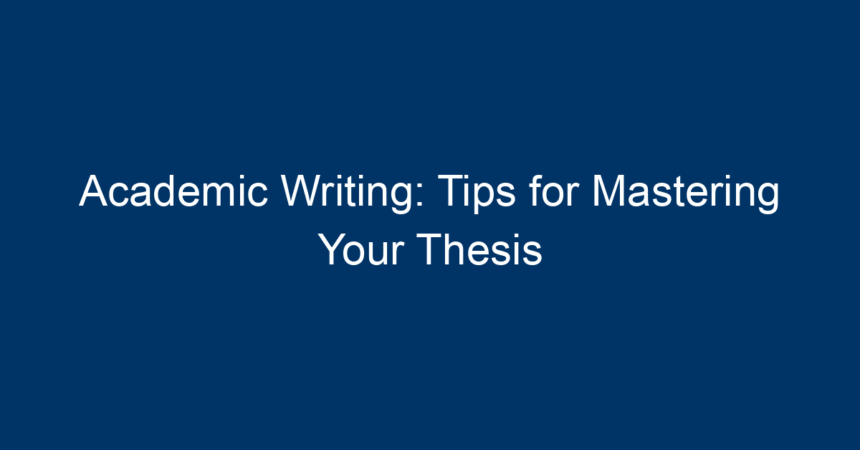Introduction
Embarking on the journey of academic writing, especially when crafting your thesis, can be both exhilarating and daunting. As a crucial component of higher education, your thesis represents a culmination of years of study, research, and intellectual growth. Not only does it demonstrate your expertise in a chosen subject, but it also contributes to the broader academic community. In this article, we’ll explore practical tips to enhance your thesis writing skills, turning your challenges into triumphs and ensuring your work stands out in the realm of academic writing.
Understanding the Basics of Academic Writing
Before delving into the specifics of your thesis, it’s important to understand the cornerstone of academic writing. This genre requires clarity, precision, and a critical approach to the subject matter. Here are some essential elements to keep in mind:
Clarity and Precision
In academic writing, clarity reigns supreme. Avoid using complex jargon or convoluted sentences that may confuse your readers. Instead, aim for straightforward language that conveys your ideas flawlessly. Remember, your goal is to communicate findings effectively, not just to impress with your vocabulary.
Structure and Organization
A well-structured thesis typically follows a specific format, which includes an introduction, literature review, methodology, findings, discussion, and conclusion. Each section should seamlessly flow into the next, guiding the reader through your research journey. If you struggle with organization, consider using outlines or mind maps to visualize the structure of your thesis.
Evidence-Based Arguments
Your arguments should be backed by evidence. This is where your research comes into play. Utilize credible sources, including peer-reviewed journals, books, and reputable websites. Ensure that you cite your sources correctly, as academic integrity is a vital aspect of academic writing.
Choosing the Right Topic for Your Thesis
Selecting a topic can feel overwhelming, but it’s the first step in your thesis writing process. An engaging and relevant topic will not only make your writing experience enjoyable but also ignite interest in your readers.
Align with Your Interests
Choose a topic that genuinely intrigues you. Not only will this passion reflect in your writing, but it will also sustain your motivation throughout the lengthy process of research and writing. Identify your interests by exploring recent trends in your field of study or consulting with your advisors.
Consider Relevance and Scope
Your topic should fill a gap in existing research. Conduct a preliminary literature review to identify unresolved questions or emerging debates in your field. Be mindful, however, of the scope—ensure that it’s narrow enough to address in depth, yet broad enough to gather sufficient data.
Get Feedback Early
Once you have a topic in mind, discuss it with mentors or peers to gain valuable feedback. This can help refine your focus and enhance the academic significance of your work.
Conducting Effective Research
Thorough research is the backbone of any strong thesis. It’s essential to collect robust and relevant data to support your arguments.
Utilize Multiple Sources
Don’t limit yourself to a single type of source. Incorporate a mix of qualitative and quantitative research. Use books, journals, articles, and interviews to support your statements. Additionally, databases such as JSTOR, Google Scholar, or Academic Search Complete can provide a treasure trove of scholarly materials.
Take Organized Notes
As you gather information, create a system for organizing your notes. This could be digital or on paper, but ensure that it’s systematic and easy to navigate. Highlight key points and jot down citations alongside your notes, making it easier to refer back during the writing process.
Summary and Reflection
After collecting data, take time to synthesize your findings. Reflect on how they align with your thesis statement and the arguments you intend to make. This thought process will facilitate a smoother writing phase.
Mastering the Writing Process
With your research completed, it’s time to put your ideas into writing. This phase can be challenging, but following a structured approach will make it more manageable.
Drafting Your Thesis
Begin with a rough draft. Don’t aim for perfection—focus on getting your ideas down on paper. Break the writing process into manageable sections, and tackle one part of your thesis at a time. This will help avoid the overwhelming feeling of needing to write everything at once.
Create an Engaging Introduction
Your introduction should provide a compelling overview of your thesis topic. Clearly state your research question, and articulate the significance of your work. A strong introduction hooks the reader, laying the groundwork for your arguments.
Develop Clear and Concise Arguments
As you write the body of your thesis, focus on making your arguments clear, coherent, and concise. Each paragraph should focus on a single idea, supported by evidence. Transition smoothly between ideas to maintain the flow of your narrative.
Craft an Impressive Conclusion
Your conclusion should summarize your main arguments, restate the significance of your findings, and propose avenues for future research. It’s an opportunity to leave a lasting impression and underscore the importance of your work in the landscape of academic writing.
Editing and Revising Your Work
Editing is a critical step in ensuring the quality of your thesis. A well-edited piece not only demonstrates professionalism but also enhances clarity.
Take Breaks Before Editing
After completing your draft, take a short break before diving into the editing process. This allows you to return to your work with fresh eyes, making it easier to spot errors and identify areas for improvement.
Focus on Clarity and Coherence
During the editing phase, pay attention to clarity, coherence, and logical flow. Ask yourself if your argument is easy to follow—if not, revise accordingly. Ensure that each paragraph contributes to your overall thesis statement.
Proofread for Grammar and Style
Don’t overlook the importance of grammar and style. Utilize tools like Grammarly or Hemingway for grammar checks, but don’t solely rely on software. Obtain feedback from peers or mentors who can provide insights into your writing style.
Conclusion: Actionable Insights
Writing a thesis is a significant accomplishment that requires dedication and skill in academic writing. By focusing on clarity, organization, and evidence-based arguments, you can create a compelling narrative that showcases your expertise and insights.
Final Tips
- Plan Ahead: Allocate sufficient time for each phase—research, writing, and editing.
- Seek Feedback: Regularly consult with advisors to refine your topic and improve your arguments.
- Stay Motivated: Set small goals and reward yourself as you achieve them.
- Engage with the Community: Join writing groups or forums to share experiences and gain support.
By applying these tips, you’ll not only master the art of academic writing but also produce a thesis that stands as a testament to your hard work and intellectual growth. Embrace the challenge, and let your passion for knowledge shine through your writing!




